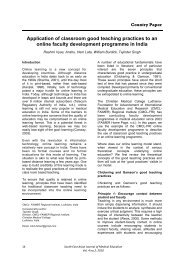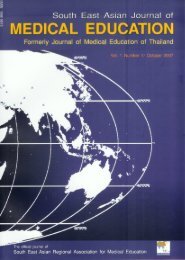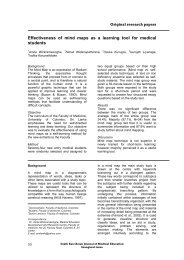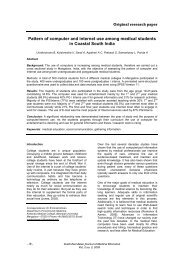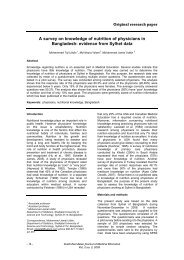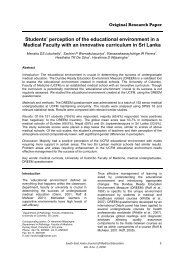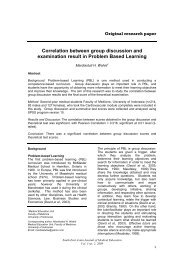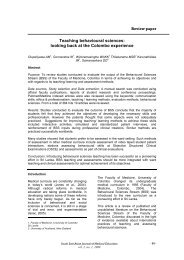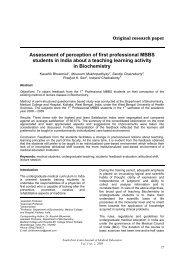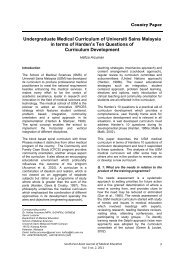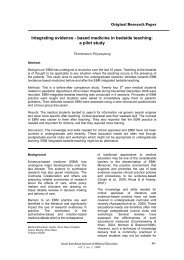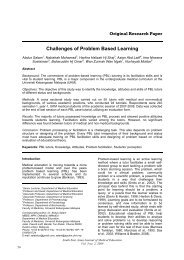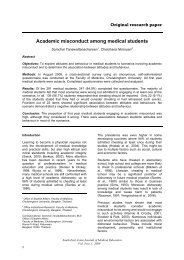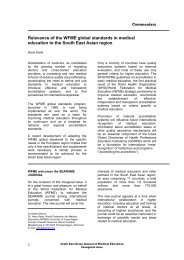Small group facilitation skills in problem-based learning - South East ...
Small group facilitation skills in problem-based learning - South East ...
Small group facilitation skills in problem-based learning - South East ...
You also want an ePaper? Increase the reach of your titles
YUMPU automatically turns print PDFs into web optimized ePapers that Google loves.
teacher has the responsibility to establish an<br />
environment that encourages learn<strong>in</strong>g.<br />
Faculty development programmes<br />
Faculty development programmes have<br />
received less priority <strong>in</strong> <strong>South</strong> Asia. In India,<br />
National Teachers’ Tra<strong>in</strong><strong>in</strong>g Centers (NTTCs)<br />
conduct tra<strong>in</strong><strong>in</strong>g programmes for medical<br />
teachers (Bansal & Supe, 2007).<br />
These programmes are held over a ten<br />
day period and cover areas such<br />
as educational objectives, educational<br />
methods, media, assessment methods and<br />
curriculum plann<strong>in</strong>g. Such programmes may<br />
be <strong>in</strong>adequate for the number of teachers and<br />
certa<strong>in</strong> private medical <strong>in</strong>stitutions <strong>in</strong> India<br />
have developed l<strong>in</strong>ks with <strong>in</strong>ternational<br />
medical schools.<br />
The FAIMER Institute<br />
The Foundation for Advancement of<br />
International Medical Education and Research<br />
(FAIMER) <strong>in</strong>stitute is a two-year fellowship<br />
programme which has been designed for<br />
medical school faculty from develop<strong>in</strong>g<br />
countries (Norc<strong>in</strong>i et al., 2005). The<br />
programme is designed to teach educational<br />
methods and leadership <strong>skills</strong> and to develop<br />
strong professional bonds with other medical<br />
educators. A community of medical educators<br />
is be<strong>in</strong>g created <strong>in</strong> many develop<strong>in</strong>g countries<br />
and retention of physicians may be promoted<br />
(Burdick et al., 2006). FAIMER stresses <strong>skills</strong><br />
necessary to be a successful PBL facilitator.<br />
Facilitator tra<strong>in</strong><strong>in</strong>g workshops <strong>in</strong> developed<br />
nations<br />
In the United States, a one-day workshop<br />
consist<strong>in</strong>g of five small <strong>group</strong> sessions with<br />
two facilitators was used to tra<strong>in</strong> faculty <strong>in</strong><br />
<strong>problem</strong>-centered, learner-focused, small<strong>group</strong><br />
process (PLS) (Crites et al., 2002). The<br />
<strong>in</strong>itial discussion centered on the concepts and<br />
pr<strong>in</strong>ciples related to successful <strong>facilitation</strong><br />
<strong>skills</strong> while the subsequent four small <strong>group</strong>s<br />
re<strong>in</strong>forced these concepts and pr<strong>in</strong>ciples us<strong>in</strong>g<br />
case scenarios and role plays. In Seattle, US a<br />
two-hour faculty development programme was<br />
conducted <strong>in</strong> small <strong>group</strong> <strong>facilitation</strong> (Kim et<br />
al., 2003). Faculty members first shared their<br />
experiences <strong>in</strong> manag<strong>in</strong>g small <strong>group</strong>s and<br />
then engaged <strong>in</strong> role plays <strong>based</strong> on the<br />
scenarios exemplify<strong>in</strong>g challeng<strong>in</strong>g <strong>group</strong><br />
dynamics. The faculty found the role plays<br />
<strong>in</strong>teractive, experiential, comfortable and fun<br />
(Kim et al., 2003).<br />
A three-day course designed for medical<br />
school faculty to promote self-directed<br />
learn<strong>in</strong>g, teach<strong>in</strong>g <strong>skills</strong>, personal awareness<br />
and <strong>in</strong>terdiscipl<strong>in</strong>ary collegiality (Pololi et al.,<br />
2001) was found to be highly effective <strong>in</strong><br />
<strong>in</strong>itiat<strong>in</strong>g a long-term faculty development<br />
programme. The academies of medical<br />
educators at Harvard Medical School (Thibault<br />
et al., 2003) and the University of California,<br />
San Francisco (Cooke et al., 2003) are two<br />
examples of successful tra<strong>in</strong><strong>in</strong>g programmes<br />
for tutor facilitators. In the University of<br />
<strong>South</strong>ern California, School of Dentistry a PBL<br />
process workshop was conducted (Dalrymple<br />
et al., 2007) and learn<strong>in</strong>g theory support<strong>in</strong>g<br />
PBL was <strong>in</strong>troduced and an extended role play<br />
method was used to provide participants with<br />
personal experience of the PBL learn<strong>in</strong>g cycle.<br />
Facilitation <strong>skills</strong> <strong>in</strong> <strong>South</strong> Asia<br />
There have not been many studies on PBL<br />
<strong>facilitation</strong> <strong>skills</strong> <strong>in</strong> <strong>South</strong> Asia. At the BP<br />
Koirala Institute of Health Sciences (BPKIHS)<br />
<strong>in</strong> Dharan, Nepal a three day tra<strong>in</strong><strong>in</strong>g session<br />
for PBL was held for teachers <strong>in</strong> which there<br />
was a significant <strong>in</strong>crease <strong>in</strong> knowledge about<br />
various aspects of PBL follow<strong>in</strong>g the<br />
workshop. Teachers felt the <strong>skills</strong> learnt would<br />
be very useful <strong>in</strong> their work situation (Baral et<br />
al., 2010). At Aga Khan University (AKU) <strong>in</strong><br />
Pakistan, structured small <strong>group</strong> experiential<br />
learn<strong>in</strong>g was used to enhance <strong>skills</strong> <strong>in</strong> PBL<br />
<strong>facilitation</strong> (Sadaf et al., 2009). Participant<br />
feedback was positive and the exercise<br />
provided faculty with an opportunity to practice<br />
<strong>facilitation</strong> <strong>skills</strong> and develop a standard<br />
approach to deal with difficult situations dur<strong>in</strong>g<br />
small <strong>group</strong> dynamics. At AKU, Pakistan<br />
facilitators are a heterogeneous <strong>group</strong> of<br />
<strong>in</strong>dividuals and are <strong>in</strong>troduced to basic<br />
educational pr<strong>in</strong>ciples of PBL and attend<br />
formal <strong>facilitation</strong> tra<strong>in</strong><strong>in</strong>g workshops (Saeed et<br />
al., 2010). The study has shown that recent<br />
medical graduates may be more effective as<br />
facilitators compared to established faculty<br />
members. In attributes such as ask<strong>in</strong>g<br />
appropriate questions, prioritiz<strong>in</strong>g learn<strong>in</strong>g<br />
objectives and identify<strong>in</strong>g misconceptions,<br />
recent graduates performed better than<br />
established faculty. At AKU, <strong>skills</strong> of residents<br />
were compared with faculty members <strong>in</strong><br />
facilitat<strong>in</strong>g PBL sessions (Jafri et al., 2007).<br />
Knowledge Base Content Learn<strong>in</strong>g (KBCL),<br />
PBL, Student Centered Learn<strong>in</strong>g (SCL) and<br />
Group Skills (GS) were assessed. Faculty<br />
showed a greater rat<strong>in</strong>g <strong>in</strong> KBCL and <strong>in</strong> overall<br />
scores. The authors concluded that residents<br />
and postgraduates could be an effective<br />
supplement to faculty members <strong>in</strong> PBL.<br />
20<br />
<strong>South</strong>‐<strong>East</strong> Asian Journal of Medical Education<br />
Vol. 4 no.2, 2010



